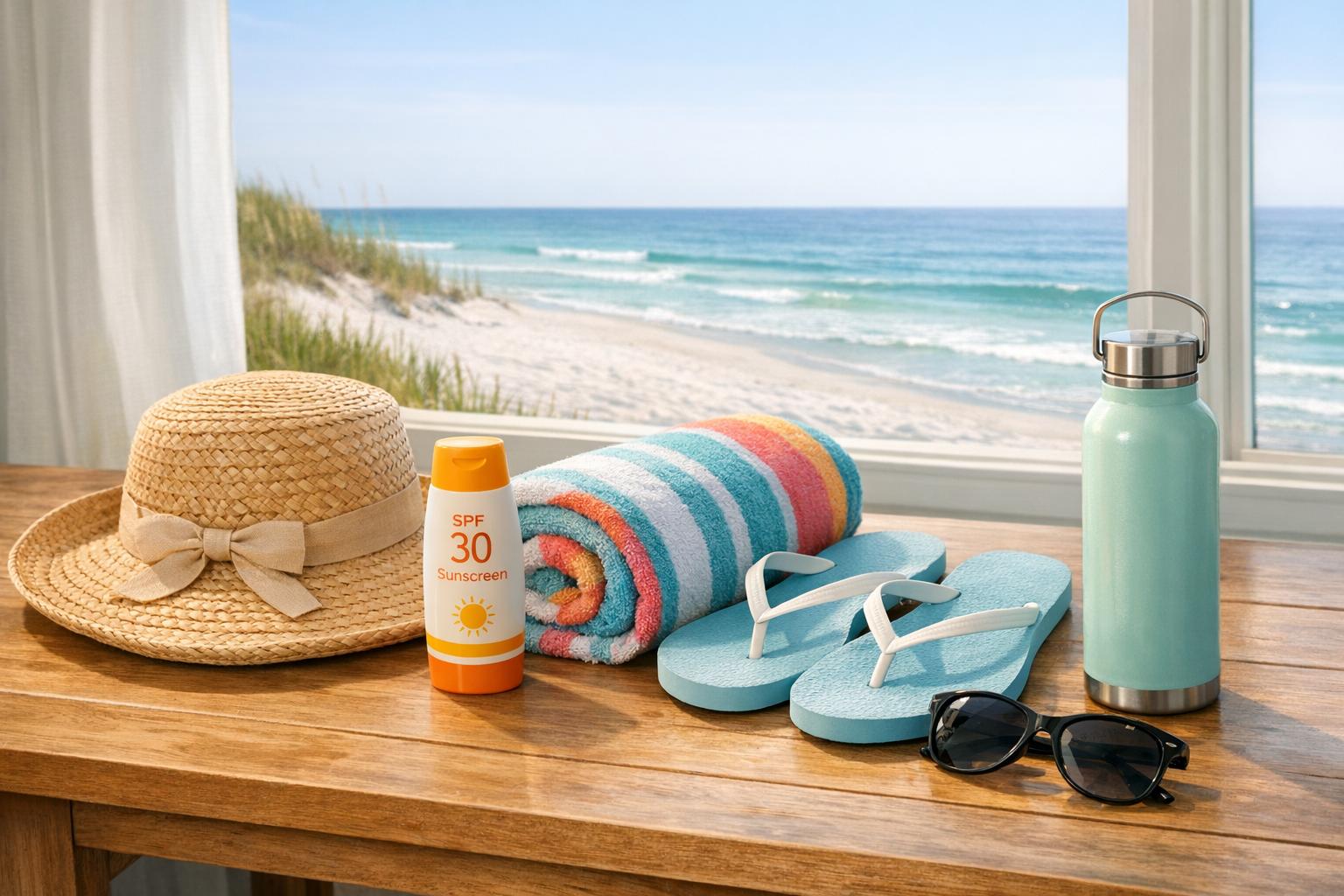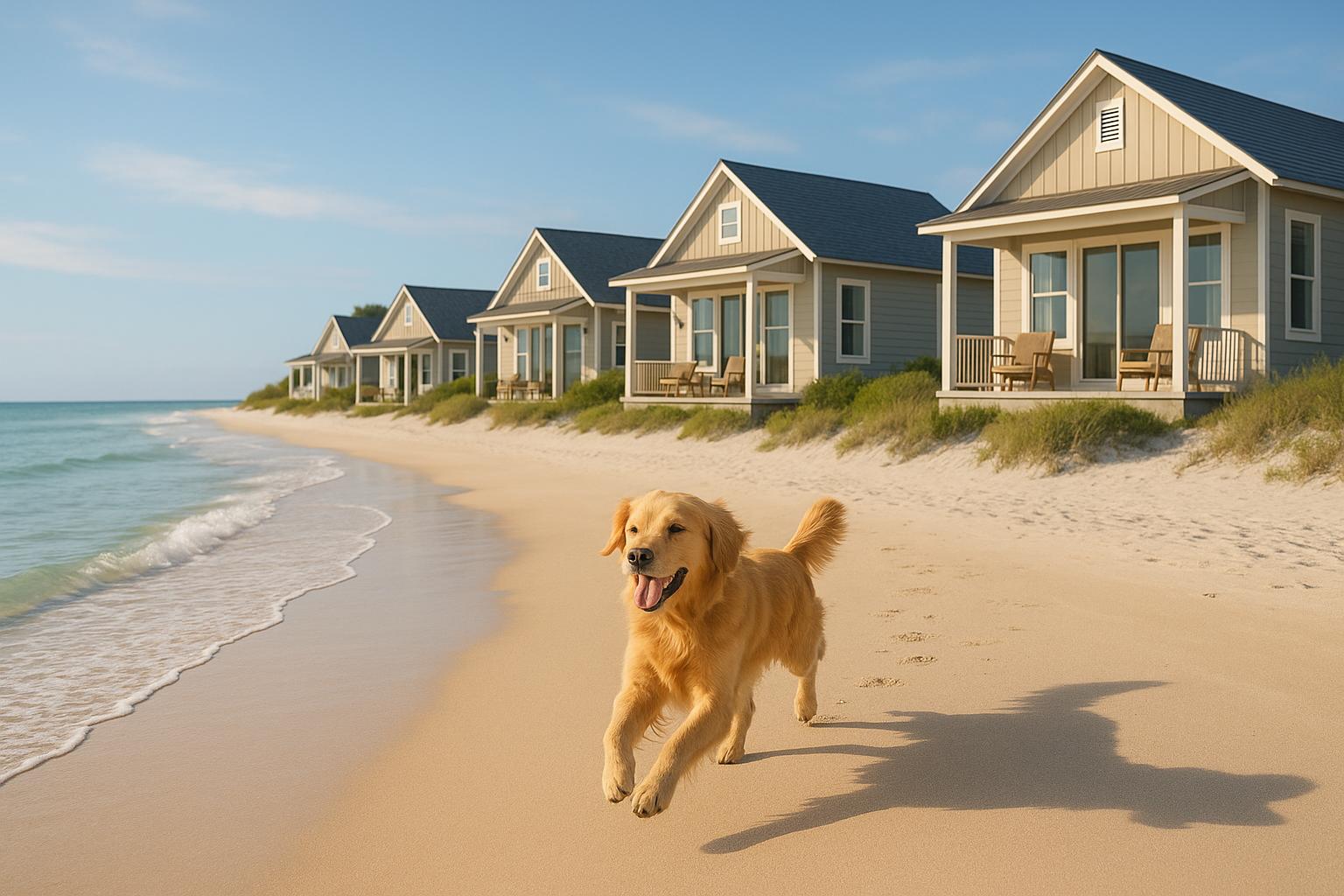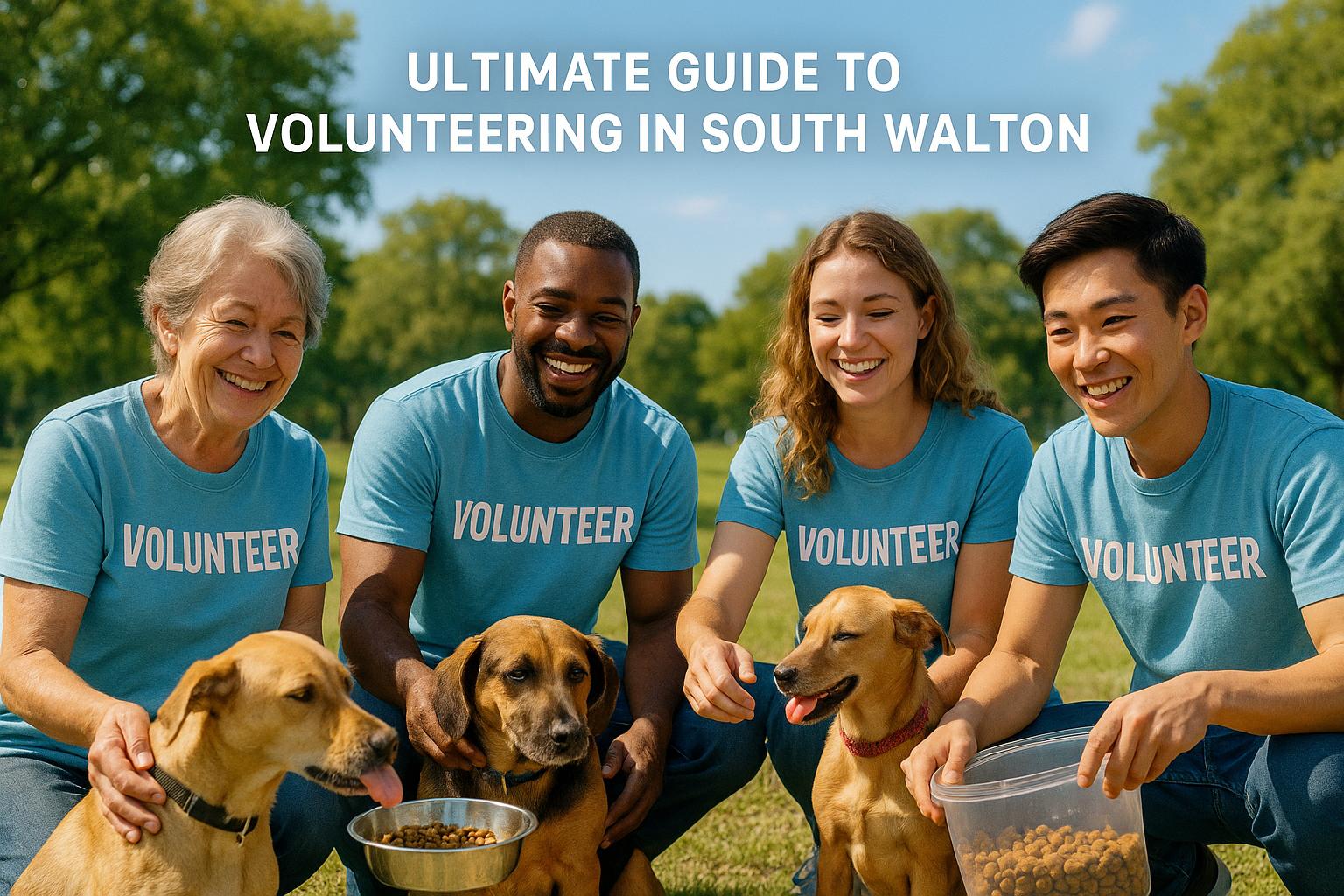If you’re planning to visit 30A beaches with your dog, here’s what you need to know:
- Permits are required: Only full-time Walton County residents or property owners can apply. Visitors and part-time residents cannot bring dogs unless staying with a permit holder.
- Permit cost: $40 per year, per dog. Permits must be renewed annually by August 1.
- Beach hours for dogs: Allowed only between 3:30 PM and 8:30 AM daily.
- Leash required: Dogs must always be on a leash no longer than 6 feet.
Violations, like not having a permit or failing to clean up after your pet, can result in fines up to $500. While visitors can’t bring dogs to the beach, there are many dog parks, trails, and pet-friendly restaurants nearby to enjoy with your pet.
Follow the rules to avoid penalties and keep the beaches enjoyable for everyone. Visit sowal.co for more details and updates.
How to Bring Your Dogs on 30A Beaches? Everything You Need to Know 🐾 🌊🏡
Permit Requirements and Who Can Apply
To enjoy Walton County's dog-friendly beaches, you’ll need to meet specific residency or property ownership requirements to apply for a permit.
Who Can Get a Dog Beach Permit
Dog beach permits are available only to full-time Walton County residents and property owners. Unfortunately, visitors, seasonal residents, and non-residents are not eligible. Full-time residents must provide documentation proving their residency, such as a lease or utility bills. Property owners, on the other hand, need to show valid proof of ownership within Walton County.
If you're visiting and staying with someone who holds a valid permit, you can bring your dog under their permit. This is the only exception to the rule, so make sure to plan accordingly if you're just passing through.
How to Apply for Your Permit
Once you’ve confirmed your eligibility, here’s how to apply:
- Submit two forms of proof showing residency (like a lease and utility bills) or valid documentation proving property ownership.
- Include proof of your dog’s current rabies vaccination.
- Pay the annual fee, which is around $40 per dog.
You can apply online by uploading the required documents or visit in person to complete the process. Keep in mind, permits must be renewed every year by August 1.
Using and Displaying Your Permit
After approval, you'll receive a permit tag for your dog. This tag must be attached to your dog’s collar whenever you're at the beach. Failing to display the tag can result in fines of up to $500. Sharing or transferring permits is strictly prohibited - each permit is tied to a specific dog and owner. Using someone else’s permit or not having a valid one could lead to hefty fines or even losing beach access privileges. So, always ensure your permit is up to date and properly displayed to avoid any issues.
Leash Laws and Owner Responsibilities
If you're planning to bring your dog to the 30A beaches, it's important to know the rules about leashes and owner responsibilities.
Leash Rules
Dogs must always be on a leash while on 30A beaches - no exceptions. The leash should be secure, non-retractable, and no longer than 6 feet. This helps ensure the safety of your pet, other beachgoers, and local wildlife.
Supervision and Cleanup
Keeping your dog under constant supervision is just as important as following leash rules. Always keep your pet within sight to prevent any unexpected situations or interactions with wildlife.
Cleaning up after your dog is non-negotiable. Be prepared by carrying extra waste bags to handle any messes promptly. It's not just courteous - it’s required.
For added ease, local veterinarians and animal behaviorists suggest using toys or treats to keep your dog focused and reduce distractions while enjoying the beach. You can check out sowal.co for more tips and updates.
Beach Hours and Off-Limits Areas
If you're planning a trip to 30A beaches, timing and location rules are key. The area has specific hours and restrictions you’ll need to follow.
When Dogs Are Allowed
On 30A beaches, dogs are welcome during limited hours: from 3:30 PM to 8:30 AM daily. Service animals, however, are an exception - they’re allowed on the beach at any time, as outlined by federal law. While timing is important, understanding where dogs are prohibited is just as crucial.
Areas Where Dogs Are Not Allowed
Some spots are strictly off-limits to dogs. For example, Destin beaches and private beaches do not allow dogs under any circumstances, even if you have a permit. Public access points often have clear signage outlining dog-friendly hours and any permit requirements. For the latest maps and updates, you can also visit sowal.co.
When heading to the beach, double-check the rules at entry points or online to avoid any surprises.
sbb-itb-d06eda6
Fines, Rule Enforcement, and Beach Etiquette
Breaking dog beach rules on 30A can lead to fines and other penalties. These measures build upon existing guidelines for permits and leash use to ensure everyone enjoys the beach responsibly.
Fines for Breaking Rules
Violating the rules comes with consequences. First-time offenses typically result in fines, while repeat violations lead to steeper penalties. Common issues include not displaying a valid permit, letting dogs roam off-leash during designated hours, or failing to clean up pet waste promptly. Serious or repeated violations may even result in permit revocation or temporary bans for both the dog and the owner. In more severe cases, especially those involving public safety or harm to protected wildlife, legal action might follow.
How Rules Are Enforced
Regular patrols by code enforcement officers help ensure everyone follows the rules. Officers check for visible permits, proper leash use, and immediate cleanup of pet waste. They also monitor restricted areas to ensure dogs stay out of zones marked off-limits.
If an officer approaches you, stay calm and present your permit. Minor first-time infractions might receive a warning, but repeat or serious violations are typically met with citations.
Being Respectful to Others and Wildlife
Following the rules isn’t just about avoiding fines - it’s about being a responsible part of the 30A community. Always leash your dog, clean up waste immediately, and ensure your pet doesn’t disturb wildlife.
Respect for local wildlife is crucial. Keep your dog away from marked nesting areas, such as those for sea turtles or birds, and avoid letting your pet disturb the dunes, as these areas are vital for fragile ecosystems. Stick to designated paths to minimize your impact.
Local resources, like sowal.co and nearby animal hospitals, encourage dog owners to familiarize themselves with current regulations before heading to the beach. Always carry waste bags, participate in community clean-up events, and set an example for others. Experts also advise socializing your dog to help them stay calm around crowds and wildlife, and checking for updated rules, particularly during busy seasons or special events.
Small actions can go a long way. Bring extra waste bags, keep your dog under control near other visitors, and respect signs marking restricted areas. These efforts help maintain dog-friendly policies on 30A beaches, ensuring they remain a welcoming space for years to come.
Other Dog-Friendly Options and Local Services
If you're unable to get a beach permit, don’t worry - there are plenty of other dog-friendly spots in 30A to explore. These alternatives provide additional ways to enjoy a pet-friendly lifestyle while working within the area's beach regulations.
Dog Parks and Pet-Friendly Places
Alaqua Unleashed Dog Park in Santa Rosa Beach is a favorite among locals and visitors. This off-leash park features open spaces, separate play areas for dogs of different sizes, shaded seating for owners, and water stations to keep pups hydrated. The park also supports animal rescue efforts by hosting community events and fundraisers.
Another great spot is the 30Avenue Dog Park, located near the shopping and dining district. This fenced area provides a secure environment for dogs to socialize and exercise.
For those who enjoy hiking, Point Washington State Forest and Topsail Hill Preserve State Park welcome leashed dogs on their scenic trails. These paths wind through coastal forests and dunes, offering a chance to explore nature with your furry companion. Just remember, dogs must stay on a leash at all times in these parks.
Several restaurants in the area, like The Shrimp Shack in Seaside, offer dog-friendly outdoor seating. Many of these spots provide water bowls and shaded areas to keep your pet comfortable. It's a good idea to call ahead to confirm their current pet policies.
If you're planning a longer stay, companies like Benchmark Management offer pet-friendly rental options in 30A. These properties often include fenced yards and easy access to trails. Keep in mind, most rentals charge a non-refundable pet fee and typically allow up to two dogs, each with a maximum weight of 30 lbs.
Pet Stores and Services
For pet supplies, Furry Fanatics is a go-to spot, offering everything from food and toys to travel accessories. If your dog needs grooming, Shabby to Chic Dog Grooming provides professional services to help maintain your pet’s coat and skin in the coastal climate.
When it comes to medical care, Santa Rosa Beach and the surrounding 30A area have several veterinary clinics and animal hospitals. It's always a good idea to have local vet contact information on hand, as well as the location of the nearest 24-hour emergency animal hospital for urgent situations.
The growing popularity of pet-friendly options in 30A has encouraged more businesses to cater to dog owners. Many places now offer amenities like outdoor seating and water bowls to make pets feel welcome. For the latest updates on pet-friendly activities and services, check out sowal.co, which provides detailed information about South Walton and the 30A coastline.
Community events are another highlight of the area's pet-friendly culture. From adoption drives to fundraising walks and social meetups, these gatherings offer excellent opportunities for dogs to interact and for owners to connect with other pet lovers. Together, these services and venues make it easy to enjoy all that 30A has to offer with your four-legged friend.
Summary: What Dog Owners Need to Know About 30A Beaches
Taking your dog to 30A beaches comes with specific rules, and it’s important to follow them closely. Only full-time Walton County residents and property owners can apply for the required $40 annual permit - this option isn’t available for visitors or part-time residents.
To apply, you’ll need to provide two proofs of residency or property ownership along with a current rabies vaccination record. Once approved, the permit tag must always be displayed on your dog’s collar. Keep in mind, all permits expire on August 1 annually.
Dogs are only allowed on the beach during specific hours - between 3:30 p.m. and 8:30 a.m. - and must always be on a leash. Local code enforcement officers patrol the area regularly, and violations can lead to fines of up to $500 for repeat offenders. Pet owners are also responsible for supervising their dogs, cleaning up after them, and being considerate of other beachgoers and wildlife.
If you’re unable to get a permit, don’t worry - there are plenty of great pet-friendly options nearby. Your dog can enjoy off-leash fun at Alaqua Unleashed Dog Park, explore the hiking trails at Point Washington State Forest, or join you at several restaurants offering dog-friendly outdoor seating.
For those eligible, it’s a good idea to apply for permits early, gather the required documents, and plan your beach outings during the allowed hours. Visitors without permits can still have a fantastic vacation by exploring the area’s many pet-friendly alternatives.
For the latest rules and helpful tips about South Walton and the 30A coastline, visit sowal.co. It’s a great resource to ensure your trip is stress-free and enjoyable.
FAQs
How can full-time Walton County residents apply for a dog beach permit?
If you live in Walton County full-time, you can apply for a dog beach permit at the Walton County Clerk of Courts office. To get started, bring proof of residency - like a valid driver’s license with your Walton County address - and documentation showing your dog’s current rabies vaccination.
Once your application is approved, the permit grants your dog access to designated beach areas during set hours. Remember, permits need to be renewed every year. Be sure to follow leash laws and beach rules to keep the experience safe and enjoyable for everyone.
Can visitors bring their dogs to 30A beaches, and are there any exceptions to the rules?
Yes, you can bring your dog to 30A beaches, but there are a few important rules to keep in mind. Dogs are only allowed on the beach during specific hours, and you'll need a valid permit. These permits are usually available to Walton County property owners or residents, so visitors might not qualify unless they meet those requirements.
Your dog must always be on a leash and under control while on the beach. Some areas may have additional restrictions, so it’s a good idea to review local guidelines before heading out. For detailed information about permits and regulations, reach out to Walton County officials or check their website.
What can dog owners do in 30A if they don’t have a beach permit?
If you don’t have a beach permit for your dog in 30A, don’t worry - there are still plenty of ways to enjoy the area with your four-legged companion. Take advantage of the pet-friendly hiking trails and picturesque parks nearby, like Point Washington State Forest or Eden Gardens State Park, where you and your pup can explore nature together.
You’ll also find that many local cafes and restaurants with outdoor seating are happy to welcome dogs. This means you can enjoy a meal or a coffee without having to leave your furry friend behind.
For more social activities, look into dog-friendly events or community spaces in South Walton, where you can meet other pet owners and their pups. Just be sure to keep your dog leashed and follow local rules to ensure a fun and safe outing for everyone.



